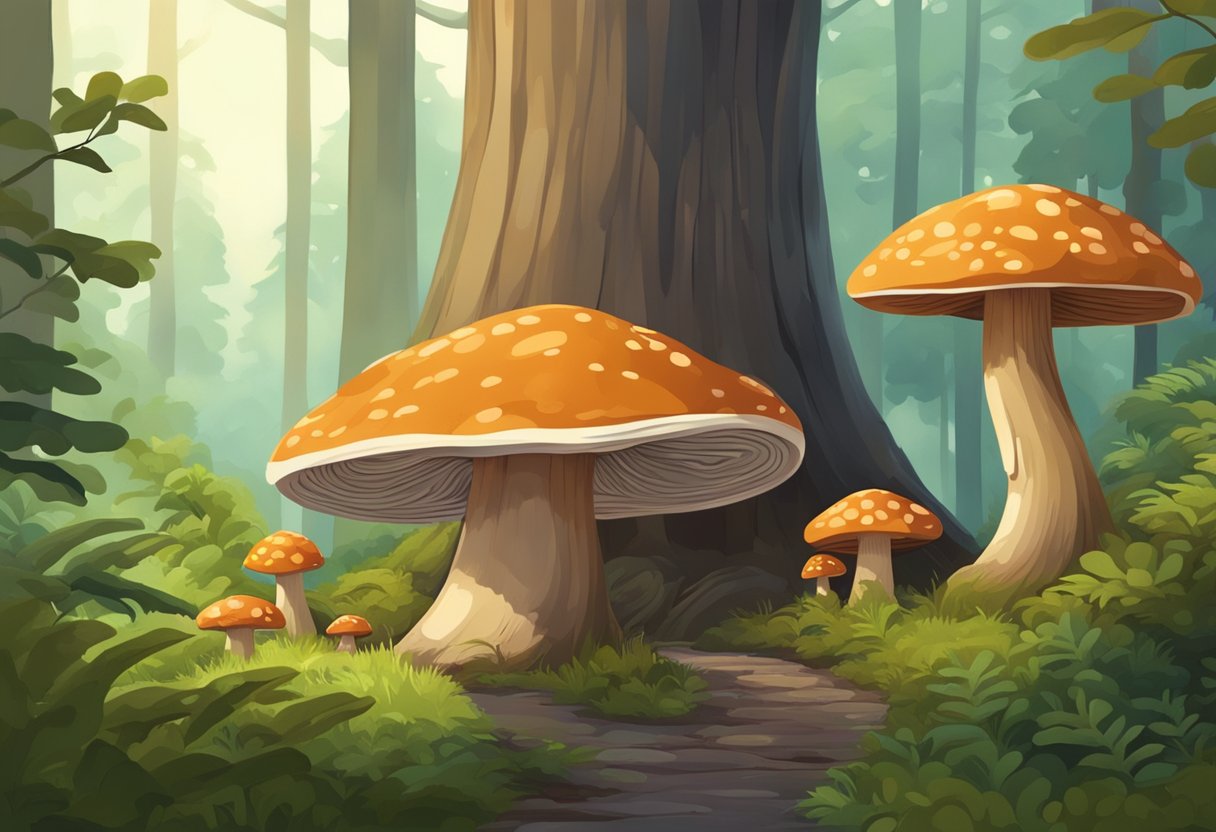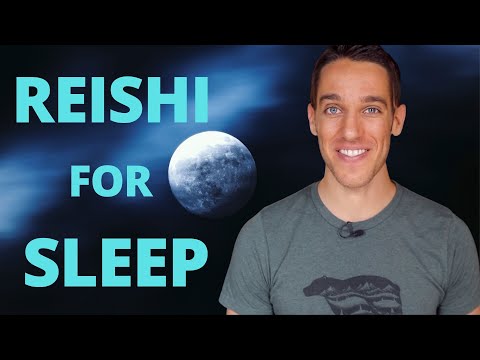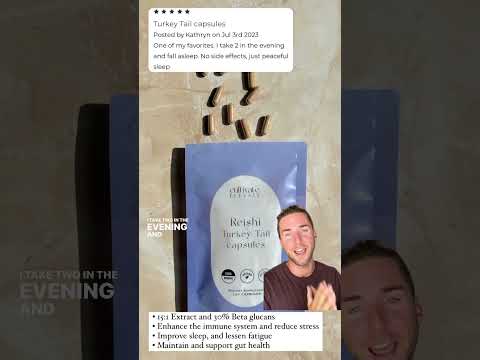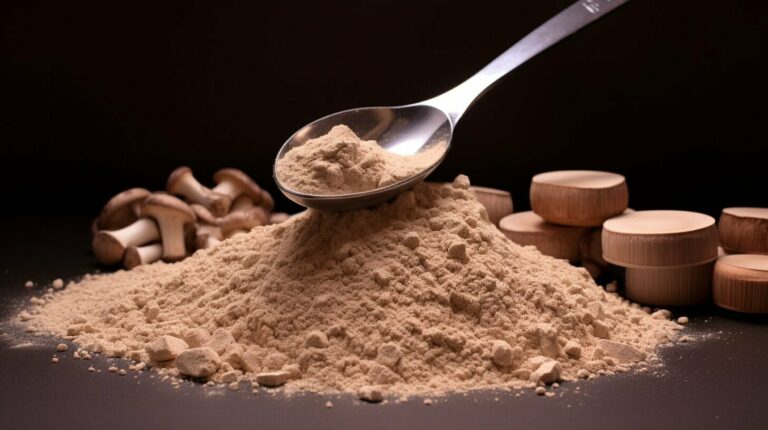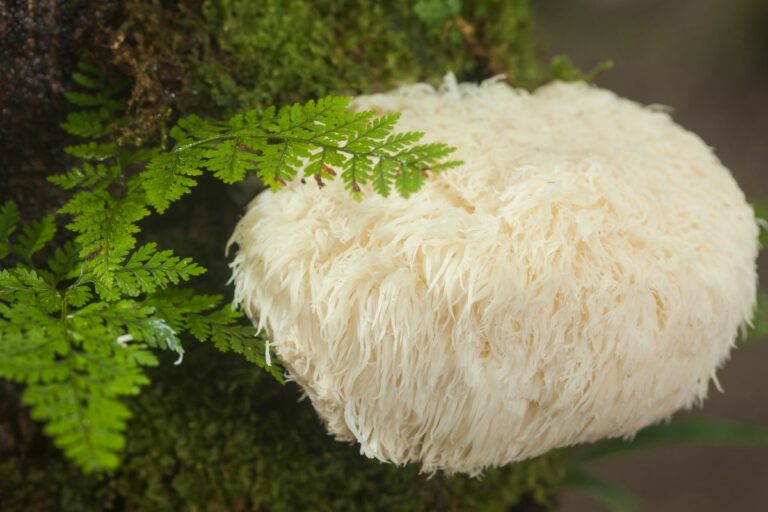The impact of Reishi mushrooms, also known as Ganoderma lucidum, on sleep has piqued the curiosity of both scientists and those seeking natural remedies for sleep disturbances. Derived from traditional Chinese medicine, Reishi mushrooms have a long history of being utilized to promote health and longevity, with recent research suggesting that they may have a positive effect on sleep. Investigations into Reishi’s potential to enhance sleep quality focus on how it may influence sleep duration and latency.

We find that studies examining the impact of Reishi on sleep often emphasize its role in increasing the overall sleep time. This is thought to be due to the mushroom’s adaptogenic properties, which may help balance the body’s stress response system. Additionally, compounds within Reishi mushrooms may interact with neurotransmitter systems, such as the gamma-aminobutyric acid (GABA) pathway, known to facilitate sleep. For instance, an extract of Ganoderma lucidum has been shown to potentiate pentobarbital-induced sleep through a mechanism that involves the GABAergic system.
Our understanding of how Reishi mushrooms assist in sleep improvement is also expanding through research on its effect on rapid eye movement (REM) sleep and non-REM sleep. Through modulating these critical sleep stages, Reishi mushrooms may impact not just the quantity but the quality of sleep, with some findings suggesting that compounds in Reishi can improve sleep in patients suffering from various conditions. These insights into the use of Reishi for sleep are contributing to a growing body of evidence supporting its use as a natural sleep aid.
Overview of Reishi
Table of Contents
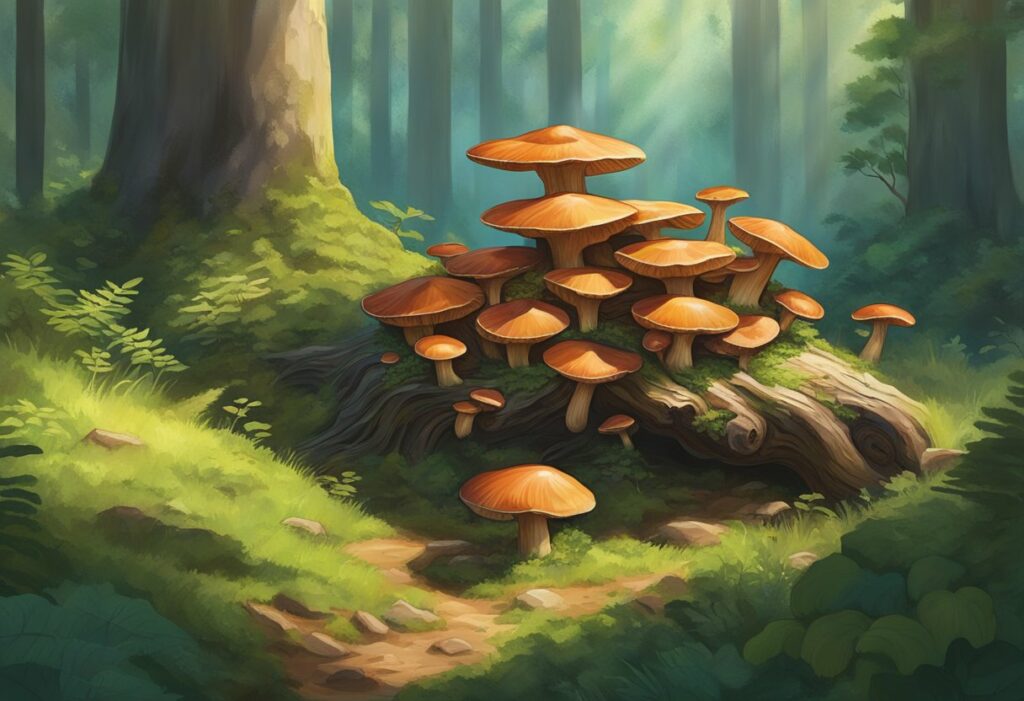
In this section, we delve into the Reishi mushroom‘s history and its traditional applications. Our exploration will equip us with a better understanding of how this mushroom has been revered throughout the ages.
Reishi Mushroom Origins
Reishi mushroom, scientifically known as Ganoderma lucidum, is a species of medicinal mushroom with a shiny, varnished appearance. Originating from Asia, particularly in China and Japan, Reishi has been found growing on hardwoods in various Asian forests. It’s recognized by its distinctive red cap and woody texture, often called the “mushroom of immortality” in ancient scriptures.
Traditional Use of Reishi
Traditionally, Reishi has been used for more than two millennia in Asia. Practitioners of traditional Chinese medicine have utilized it as a tonic for improving health and longevity. Specific uses included aiding with insomnia, enhancing immune response, and acting as an adjuvant in various treatments. It’s important to note the respect and value that Reishi commanded in ancient wellness practices—celebrated for its potential to harmonize the body’s vital functions.
Reishi and Sleep
We’re exploring the intricate relationship between Reishi, a traditional medicinal mushroom, and its effects on sleep quality and patterns.
Components of Reishi Influencing Sleep
Reishi mushrooms contain several active compounds, such as triterpenes and polysaccharides, that are linked to potential benefits for sleep. One component, lucidone D, has been associated with sedative-hypnotic activities. This means it might help in reducing the time it takes to fall asleep and potentially increasing the duration of sleep.
Reishi’s Impact on Sleep Patterns
Studies suggest that the Ganoderma lucidum species of Reishi can be influential in enhancing sleep quality. Regular intake is observed to potentially affect sleep patterns by increasing overall sleep time and improving sleep latency. It’s important to note that while some research indicates a positive impact on tiredness and malaise, the effects on sleep are not uniformly experienced by all individuals.
Scientific Research
In this section, we’ll examine empirical evidence regarding Reishi’s effects on sleep through controlled studies and analyze the coherence of research findings.
Studies on Reishi and Sleep
- Experimentation: Researchers have conducted experiments to determine if Reishi (Ganoderma lucidum) has a sedative effect on sleep patterns. One study found that an extract of Ganoderma lucidum prolonged sleep time in rats. The suggestion here is that similar effects may occur in humans due to the adaptogenic properties of the mushroom.
- Mechanism: Further research indicates that Reishi may potentiate sleep via a GABAergic mechanism, which is a system in the brain that promotes calming effects. This supports the hypothesis that Reishi facilitates sleep by modulating neurochemical pathways.
Analysis of Research Findings
When we scrutinize the findings:
- Sleep Quality: Multiple studies report improvements in sleep duration and reduced sleep latency. This implies that Reishi can help individuals fall asleep faster and sleep longer.
- GABA Activity: Since research suggests that Reishi works through enhancing GABAergic activity, it provides a plausible mechanism through which the mushroom could exert its sleep-promoting effects, aligning with scientific understandings of non-REM sleep regulation.
Reishi Consumption
In exploring the connection between reishi and sleep, we examine recommended dosages and the various forms this supplement is available in.
Recommended Dosages for Sleep
Studies have observed that reishi can influence sleep patterns. For instance, an extract of Ganoderma lucidum, commonly known as reishi, was shown to prolong sleep time in rats. While human studies are less prevalent, anecdotal evidence and traditional use suggest that dosages may vary. Functional dosages reported for sleep benefits often range from 1 to 1.5 grams of powdered extract, taken roughly 30 minutes before sleep.
Forms of Reishi Available
Reishi can be consumed in several forms, catering to different preferences and needs:
- Capsules/Pills: Easy and convenient, typically containing a powdered form of the mushroom.
- Powder: Can be mixed into drinks such as tea or smoothies.
- Tea: Some cultures drink reishi tea for relaxation properties.
- Tinctures: Liquid extracts are another popular method, often used for more precise dosage control.
When choosing a form of reishi, consider purity, sourcing, and the presence of additional ingredients which can influence its efficacy.
Potential Side Effects
Before we examine specific side effects of Reishi, it’s crucial to understand that while Reishi mushrooms have been used for centuries and are well-regarded for promoting sleep and relaxation, they may also cause adverse reactions in some individuals.
Common Side Effects
We find that some individuals may experience digestive issues such as upset stomach or diarrhea when using Reishi mushrooms. Additionally, there have been reports of dry mouth, itchiness, and rash, leading us to believe that some people might have a sensitivity or allergy to this supplement. Documented effects from studies include an increased sleep duration as Reishi’s sedative effects may be pronounced in some cases, which is particularly relevant when exploring its potential to induce sleepiness (Extract of Ganoderma lucidum prolongs sleep time in rats).
Interactions with Medications
Reishi mushrooms can interact with certain medications, specifically those that have a sedative property. If you’re taking drugs for insomnia or anxiety, for instance, Reishi may augment their effects, potentially leading to increased drowsiness. Concurrent use with anticoagulant medications might also pose a risk, as Reishi could potentially enhance the drug’s blood-thinning effects, which must be closely monitored. It’s always best to consult with a healthcare provider to ensure the safe use of Reishi with your current medication regimen.
User Experiences
In exploring the effects of Reishi on sleep, we’ve compiled both personal testimonials and gauged the public perception surrounding its somnolent properties.
Personal Testimonials
Users who have incorporated Reishi into their nightly routine have reported varied effects on their sleep patterns. For instance, a study highlighted in the search results suggests that Reishi may lead to an increase in REM sleep in certain individuals, which aligns with some personal accounts. Users often mention a reduction in sleep latency—the time it takes to fall asleep—and an increase in overall sleep duration. These anecdotes align with controlled studies, yet we acknowledge that experiences with Reishi can be subjective and influenced by external factors.
Public Perception
Public opinion on Reishi mushrooms tends to be positive, especially in communities interested in alternative medicine. Analysis of online forums and product reviews indicates that people are generally satisfied with the sleep-enhancing effects of Reishi. For example, some research suggests that the extract of Ganoderma lucidum, a type of Reishi, may prolong sleep time in rats, which seems to corroborate the user reviews that we’ve observed. However, as with all supplements, there is a spectrum of responses, and not every individual reports significant improvements in sleep quality.
Conclusion
In our assessment of Reishi mushrooms, also known as Ganoderma lucidum, we’ve uncovered evidence suggesting their potential in promoting better sleep. Studies have indicated that extracts from these mushrooms may prolong sleep time in animals and potentiate pentobarbital-induced sleep through a mechanism linked to the neurotransmitter GABA. Additionally, research has focused on the extract’s role in reducing sleep latency, which refers to the time it takes to fall asleep, and in increasing sleep duration.
We’ve considered scientific findings that highlight the sleep-enhancing properties of Reishi mushrooms. For instance, one study reports that the extract can encourage sleep by acting as an immuno-modulator. Furthermore, research hints at the possibility that Reishi could play a part in increasing REM sleep when an individual is in a state of dreaming.
Here is a summary of key points uncovered in our analysis:
- Scientifically Studied: Reishi mushroom extracts have been studied for their sleep-inducing capabilities.
- Sleep Quality: Findings suggest improvements in sleep quality, such as prolonged sleep time.
- REM Sleep: There is evidence that Reishi may affect REM sleep, associated with dreaming.
In our evaluation, it’s important to maintain a balanced perspective, as most research involves animal studies, and further investigation is needed to fully understand the efficacy and safety in humans. Those interested in using Reishi for sleep should consult with healthcare professionals to ensure it is appropriate for their individual needs.
Frequently Asked Questions

In this section, we’ll address common inquiries regarding the impacts of Reishi mushrooms on sleep, optimal consumption, possible side effects, and additional benefits.
What time of day is most optimal for taking Reishi to enhance sleep quality?
We find that consuming Reishi an hour before bedtime can be most effective for enhancing sleep quality, as it takes time for the body to metabolize the mushroom and experience its sedative effects.
Which type of mushroom is considered the best for improving sleep?
Reishi mushroom, scientifically known as Ganoderma lucidum, is renowned for its potential to improve sleep due to its tranquilizing properties and the ability to support sleep cycles.
Can consuming Reishi mushrooms lead to liver toxicity?
When taken in recommended doses, Reishi mushrooms are generally safe; however, excessive consumption over an extended period may pose a risk of liver toxicity. It’s crucial to adhere to the appropriate dosage and consult a healthcare provider.
How soon can one expect to experience the effects of Reishi mushrooms?
Some individuals may notice improvements in their sleep within a few days of taking Reishi, while for others, it might take a couple of weeks to observe the full benefits.
What is the recommended dosage of Reishi for promoting better sleep?
The optimal dosage for promoting better sleep varies, but it’s commonly suggested to start with 1 to 1.5 grams of Reishi extract in the evening and adjust as necessary.
Are there any benefits of Reishi mushrooms for the skin?
Aside from aiding sleep, Reishi mushrooms have been linked to skin benefits, potentially helping with skin health and appearance by reducing inflammation and providing antioxidants.

